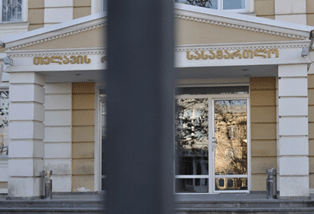Gela Mtivlishvili, Kakheti
According to research which was carried out in Georgia with the financial support of theUSAID organization, 96% of the 2000 interviewed respondents think the court judgments are fair. Based on the research, the Chairman of the Supreme Court of Georgia Kote Kublashvili stated several times that a group of people have tried to discredit the Georgian judiciary system when speaking about an unfair court.
Head of the non-governmental organization Former Political Prisoners for Human Rights Nana Kakabadze believes that the research funded by USAID does not demonstrate the real situation in Georgia.
“Such a high percentage of trust to the judiciary system is not recorded even in democratic countries where the judiciary system is independent and impartial,” said Nana Kakabadze.
According to statistical data recorded on the Supreme Court of Georgia, since 2007, only 0.1% ‘not guilty’ verdicts were passed within the Georgian judiciary system. That means in 99. 99 % of the cases, the court has found the defendant guilty.
MP Nikoloz Laliashvili from Christian-Democrat Party said the situation in passing not guilty verdicts on criminal cases is catastrophic.
“The number of not-guilty verdicts has not exceeded 0.1% for several years, in conjunction with this statistic, the number of plea-agreements has also increased. People agree to admit crimes even though they have not committed one. They know they have zero chance to win the trial,” said Laliashvili.
In 2010, courts in the Kakheti region discussed 1, 000 criminal cases. 764 of them ended with plea-agreements. All of the verdicts handed down by the judiciary in the region were guilty verdicts. According to the statists within the districts, the Telavi District Court discussed 431 criminal cases and 337 of them ended with plea-agreements; Lagodekhi District Court discussed 122 criminal cases and 78 of them ended with plea-agreements; Dedoplistskaro District Court held 67 criminal cases and 54 of them ended with plea-agreements; Sighnaghi District Court discussed 143 criminal cases and 112 of them ended with plea-agreements; Kvareli District Court discussed 114 criminal cases and 91 of them ended with plea-agreements; Sagarejo District Court discussed 123 cases and 92 of them ended with plea-agreements; Akhmeta and Gurjaani Magister Courts did not discuss criminal cases in 2010 at all.
The report by “Transparency International – Georgia” published in December of 2010 explained the high number of plea-agreements in Georgian courts by the low confidence of society towards the judiciary system. The report states that a plea-agreement is “a tool to buy freedom for money”. The report by TI-Georgia underscores the amount of money paid for plea-agreements and concluded that crime funds the state budget.
According to the report, 32, 760, 994 GEL accumulated in the state budget from plea-agreements throughout the first eight months in 2009. If the plea-agreements were signed at the same speed in the second part of 2009, the state budget could have received an additional 50 million GEL from the agreements. In total, the income from these agreements made up 1% of the entire 2010 state budget and exceeded the budgets of nine ministries and the Parliament of Georgia.
In addition to the research and statistics pertaining to the not guilty verdicts, the number of cases sent to the European Court of Human Rights also demonstrates the low confidence of Georgian society to the judiciary system. More than 5, 000 suits were submitted to the Strasbourg Court from Georgia in 2008, 2009 and 2010.
News
December 13, 2023
Ethnic minorities outside the peace dialogue
November 6, 2023
‘Peace’ agenda of political parties
Popular
Articles
February 13, 2024




